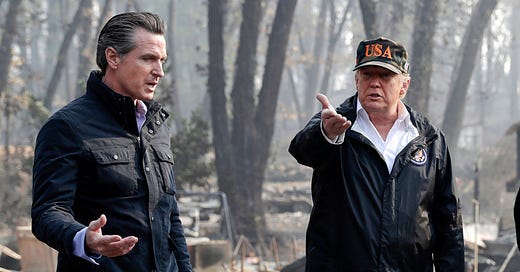Kirk | a Learn4Life CLMI feature
As election day approaches, and the two Presidential candidates battle for votes in every state, do voters wonder or know if the future President will have the power to spread their policies across every state? Now President-elect Donald Trump prepares to present an array of plans and policies accumulated over the past year of campaigning to the American people. But how exactly will he, his advisors and new government implementing them in a nation as diverse, multi-racial and large as this one?
Unbeknownst to most Americans is the power their state has in accepting or denying any President's policies. We’re about to get a very abrupt lesson in that as Democratic California Governor Gavin Newsom, long a vociferous critic of Trump, just announced the convening of a special session of the California state legislature to begin the process of “protecting the state’s progressive policies” in the midst of another Trump administration. Reports AP …
“The freedoms we hold dear in California are under attack — and we won’t sit idle,” Newsom, who reportedly has ambitions on the national stage, said in a statement. “California has faced this challenge before, and we know how to respond. We are prepared to fight in the courts, and we will do everything necessary to ensure Californians have the support and resources they need to thrive.”
Newsom’s office told The Associated Press that the governor and lawmakers are ready to “Trump-proof” California’s state laws. His announcement Thursday called on the Legislature to give the attorney general’s office more funding to fight federal challenges when they meet in December.
State Attorney General Rob Bonta said his office spent the past year reviewing more than 120 lawsuits the state filed during Trump’s first term in preparation for new federal actions. Bonta said the governor has called the special session to line up the resources that will be needed for the state to fight any Trump encroachments on its policies without giving more details on exactly what the plans would entail.
This is certainly a preview of what’s to come as many “blue,” or Democratic-led, states will begin exploring how they can preserve certain laws and protections they deem under threat from a refreshed Trump administration. There will be focus on “states’ rights” as those governments attempt to understand and navigate the new political and policymaking landscape that’s forthcoming in Washington, D.C.
Most of the broader electorate is unaware of this. A survey conducted in 2018 by John Hopkins University found that U.S. citizens know little about their state governments. 1,500 people were interviewed and the results unfortunately, tell us a negative story …
"More than half didn't know if their state had a constitution"
"About a quarter of respondents weren't sure if it was federal or state government that was mostly in charge of law enforcement"
"About 25 percent didn't know who ran elections"
The results from this survey reveal a larger and more promblematic issue: Americans’ general lack of literacy around their state governments. How can Americans properly vote for the next President if they do not understand how their state governments operate … and, how they might respond to a situation like this?
What Is A State Government?
First off, each state has its own constitution that's modeled after the national government's constitution. These state governments are formed based on the structure of a republic. In the U.S. constitution the powers of the states are outlined as the following:
Ownership of property
Education of residents
Execution of welfare programs
Protecting citizens
Preserving justice
Creating counties and districts
Sustaining highways and roads
Raising funds
These powers are preserved by the Bill of Rights and do not allow the President to interfere unless a certain state grants permission. The President can make mandates that the states need to follow, but: the federal government must fund these mandates in order for the states to administer them. For example, President Obama’s signature Affordable Care Act, implemented in 2010, is a law that the states followed because it was federally funded.
What happens if a state government does not agree with the policy a president mandates for the nation? According to the Supremacy Clause in the U.S. Constitution, the laws of the federal government have power over any state-made rules. The only way for the people to remove a federal law they disagree with is to prove that it is unconstitutional in court.
In the past many states have used this right to sue mandates made by the President which they believe are unfit as laws. A current issue that could cause state lawsuits to erupt is the controversy of abortion. Former President Donald Trump mentioned during the Presidential debate on September 10th, that in the time of his term he was able to give states the right to choose whether or not to institute abortion right: "But each individual state is voting. It's the vote of the people now. It's not tied up in the federal government."
And as NBC News reports …
Despite having teased otherwise, Trump didn’t announce support for a federal abortion ban. Trump released a video on Truth Social saying the abortion issue is appropriately handled by individual states. He didn’t say, however, what he would do if he won the presidency and Congress sent him a national ban.
“My view is, now that we have abortion where everybody wanted it from a legal standpoint, the states will determine by vote or legislation, or perhaps both, and whatever they decide must be the law of the land,” Trump said.
Exercising State Power
There are at least 13 states who have made abortion illegal since Roe v. Wade was overturned, like Idaho, Alabama, and Texas. Vice President Kamala Harris made her stance as a pro-choice advocate clear, and proclaimed that her policy plan would make it easier for women to gain abortion rights. If she had been elected President, Harris would have tried to create and implement an executive order to enforce her own mandate to protect women's rights nationally. But many anti-abortion states would have sued for their privilege to ban abortions. The state's power to overturn unlawful mandates is a part of the process to keep the President's power in check. This is just one example of how the states affect the decisions of the executive branch.
Another important power that state governments have is control over law enforcement in their state. Unknown to most Americans is the fact that state governments are given authority over the enforcement of laws according to their state constitutions. This power was given to states in the Tenth Amendment, where it states …
"The powers not delegated to the United States by the Constitution, nor prohibited by it to the States, are reserved to the States respectively, or to the people."
The U.S. Constitution also says that it is a President's job to enforce laws that Congress passes. How do the state's and the President balance the responsibility of executing laws? While a state government only has the power to enforce their own Constitution's laws, (as long as the law does not take a U.S. citizen's rights away that are described in the national Constitution) the President is in charge of administering laws approved by the legislative branch. The President does not personally carry out the enforcement of these laws. That is committed by the heads of his cabinet and other federal commissions or officers, like the Attorney General of the United States. Agencies like the Environmental Protection Agency are all under the President's command and through his instruction laws are implemented.
State governments also have the ability to use law enforcement officers and their state's national guard in a state emergency. If a state emergency is declared in the instance of an unlawful riot or foreign invasion, the Governor of that state is given extended powers to launch his state's law enforcement officers. One such event happened in Charlotte, North Carolina in 2016. After the shooting and killing of a Black man by a white police officer, large protests soon converged into unrest. These riots led to the destruction of buildings and the violent beatings of officers and civilians alike. The Governor of North Carolina in 2016, Pat McCrory, announced a state emergency that allowed him to bring in the North Carolina National Guard and the State Highway Patrol to gain control over the protesters.
An additional power given to the states that allows the fair and peaceful transfer of power from one President to another, is control over Presidential election operations. In a Presidential election, the chief election official in each state oversees the voting and counting process in each county, city or town in their designated state. Through the support of federal commissions like the Election Assistance Committee (EAC) and volunteers to manage polling stations, the counting of ballots is organized. The President at the time has no power to affect the vote of the people, as the Founders intended.
The 50 states are the foundation of the Federal government and only through the participation of those states can the government make decisions. The power of the states keeps the federal government in check. Each state government gives their citizens a voice that the President cannot ignore.
RILEY KIRK is a Fellow at the Civic Literacy and Media Influence Institute at Learn4Life.







